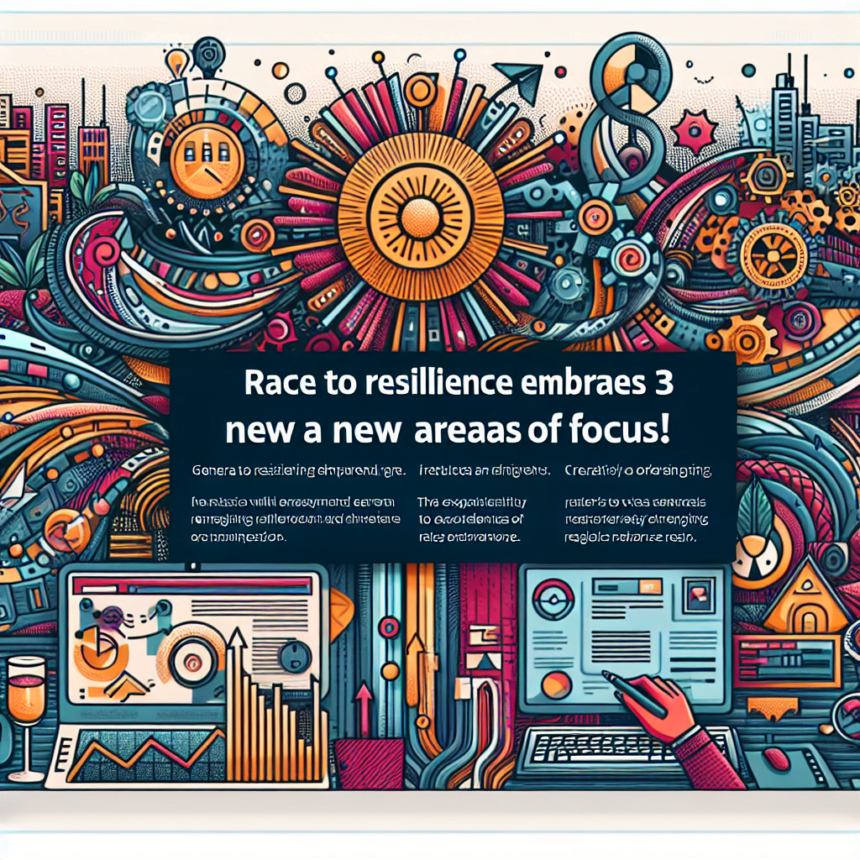Main Points In Hindi (मुख्य बातें – हिंदी में)
-
जलवायु लचीलापन का महत्व: असम (भारत), लूगा (सेनेगल), और पेरनामबुको (ब्राजील) ने रीजन्सएडाप्ट के माध्यम से रेस टू रेजिलिएंस अभियान में शामिल होकर जलवायु लचीलापन बढ़ाने की अपनी प्रतिबद्धता व्यक्त की है। ये क्षेत्र स्थानीय समुदायों को उनके पर्यावरण को बचाने और टिकाऊ भविष्य बनाने में सशक्त बना रहे हैं।
-
स्थानीय समुदायों का सशक्तिकरण: असम में, 63,441 लोग 43 संवेदनशील गांवों में जलवायु परिवर्तन के प्रभावों का सामना कर रहे हैं, जबकि लूगा में युवा किसान पुनर्योजी कृषि को अपनाकर रोजगार सृजन कर रहे हैं। पेरनामबुको तटीय पुनर्स्थापन और पारिस्थितिकी तंत्र की रक्षा के लिए प्रयासरत है।
-
विशिष्ट परियोजनाएं और कार्यक्रम: असम में मुख्यमंत्री जलवायु लचीला ग्राम फैलोशिप कार्यक्रम (सीएमसीआरवीएफ) शुरू किया गया है, जो स्नातकोत्तर छात्रों को शामिल कर जलवायु समाधान लागू करता है। लूगा में "मिनी फार्म" परियोजना युवाओं के लिए रोजगार के अवसर प्रदान कर रही है, जबकि पेरनामबुको के तटीय बहाली और अंतर्देशीय लचीलापन परियोजनाएँ जलवायु परिवर्तन के प्रभावों से निपटने का कार्य कर रही हैं।
-
सामूहिक प्रयास और सहयोग: रेस टू रेजिलिएंस अभियान के माध्यम से अब 75 क्षेत्रों में जलवायु लचीलापन के प्रयास किए जा रहे हैं। सदस्य क्षेत्रों को जलवायु कमजोरियों का आकलन करने और प्रतिक्रियाओं की योजना बनाने में अधिक समर्थन प्राप्त होगा।
- क्लाइमेट चेंज के खिलाफ नई रणनीतियाँ: इन क्षेत्रों के विशेष कार्यक्रम स्थानीय जलवायु चुनौतियों का सामना करते हुए जलवायु लचीलापन बढ़ाने, कृषि उत्पादकता में सुधार, और स्थानीय समुदायों में सहयोग को बढ़ावा देने पर केंद्रित हैं।
Main Points In English(मुख्य बातें – अंग्रेज़ी में)
Here are the main points based on the provided text:
-
Commitment to Climate Resilience:
- Assam (India), Louga (Senegal), and Pernambuco (Brazil) have joined the Race to Resilience campaign through RegionsAdapt, aiming to enhance climate resilience and empower local communities to protect their environments and create sustainable futures.
-
Community Empowerment Initiatives:
- Each region is implementing strategies to address local climate challenges:
- Assam is focusing on agricultural resilience through a fellowship program.
- Louga is promoting job creation for youth via a rural mini-farm project.
- Pernambuco is undertaking coastal restoration and inland resilience projects to combat climate impacts.
- Each region is implementing strategies to address local climate challenges:
-
Impact and Beneficiaries:
- Assam is engaging 63,441 people across 43 vulnerable villages.
- Louga aims to create 200 jobs for youth and has a population of 357,246.
- Pernambuco has a total population of 9 million, working on initiatives to safeguard their communities against climate threats.
-
Collaboration and Support:
- By joining the Race to Resilience campaign, the regions will receive support for assessing climate vulnerabilities, planning responses, and reporting progress to the global community, increasing the number of participating regions to 75.
- Innovative Local Solutions:
- Each area is harnessing local knowledge and resources to develop innovative solutions, such as Assam’s climate fellowship, Louga’s sustainable agriculture initiatives, and Pernambuco’s comprehensive strategies for coastal and agricultural resilience, illustrating how localized efforts can effectively address global climate challenges.


Complete News In Hindi(पूरी खबर – हिंदी में)
जलवायु परिवर्तन से निपटने और स्थानीय समुदायों को मजबूत बनने के लिए वैश्विक स्तर पर कई प्रयास हो रहे हैं। इस संदर्भ में, असम (भारत), लूगा (सेनेगल) और पेरनामबुको (ब्राजील) तीन नए क्षेत्र हैं, जो रीजन्सएडाप्ट की पहल, "रेस टू रेजिलिएंस" अभियान में शामिल हुए हैं। यह अभियान जलवायु लचीलापन को बढ़ावा देने और स्थायी भविष्य के निर्माण के लिए प्रतिबद्ध है।
असम, भारत: जलवायु लचीलापन के प्रति प्रतिबद्धता
असम राज्य को जलवायु परिवर्तन के गंभीर प्रभावों का सामना करना पड़ रहा है, जिसमें अनियमित मौसम, बाढ़ और सूखा शामिल हैं। यहां की लगभग 86% आबादी कृषि पर निर्भर करती है, जिससे उनकी आर्थिक स्थिति और जीवनयापन पर संकट पैदा हो रहा है। रिसर्च में यह पाया गया है कि असम भारत के सबसे अधिक जलवायु-संवेदनशील क्षेत्रों में से एक है।
इन चुनौतियों का सामना करने के लिए, असम सरकार ने 2022 में मुख्यमंत्री जलवायु लचीला ग्राम फैलोशिप कार्यक्रम (CMCRVF) शुरू किया। इस कार्यक्रम का लक्ष्य युवाओं को जलवायु लचीला समाधान लागू करने में सशक्त बनाना है। स्नातकोत्तर विज्ञान और इंजीनियरिंग छात्रों को 100 अत्यधिक संवेदनशील गांवों में मजबूत और अनुकूलित कार्य योजनाएं बनाने के लिए शामिल किया गया है। यह पहल न केवल स्थानीय समुदायों को जलवायु परिवर्तन के प्रति जागरूक करती है, बल्कि उन्हें निर्णय लेने की प्रक्रिया में भी भागीदार बनाती है।


लूगा, सेनेगल: कृषि में नवाचार और रोजगार के अवसर
सेनेगल का लूगा क्षेत्र जलवायु परिवर्तन के प्रभावों का सामना कर रहा है, जिसमें मुख्य रूप से बढ़ते तापमान की समस्या है। यहां के युवा किसान कृषि के क्षेत्र में नए तरीके अपना रहे हैं। "मिनी फार्म" परियोजना का उद्देश्य कृषि व्यवसाय को बढ़ावा देना है, जिससे स्थानीय युवाओं के लिए रोजगार के अवसर उपलब्ध हो सकें।
यह परियोजना चार कम्यून में शुरू की गई थी, जहां एक-हेक्टेयर कृषि मिनी फार्म स्थापित किया गया। इस पहल का उद्देश्य न केवल आर्थिक स्थिरता सुनिश्चित करना है, बल्कि स्थानीय निवासियों को जलवायु परिवर्तन के प्रभावों से निपटने में मदद करना भी है। इससे स्थानीय समुदायों में उद्यमिता की भावना को बढ़ावा मिलता है और कृषि क्षेत्र में युवाओं के कौशल को मजबूत किया जाता है।
पेरनामबुको, ब्राजील: तटीय संरक्षण और अंतर्देशीय अनुकूलन
ब्राजील के पेरनामबुको क्षेत्र को जलवायु परिवर्तन के कारण कई गंभीर चुनौतियों का सामना करना पड़ रहा है, जिसमें बढ़ता समुद्र स्तर और सूखा शामिल हैं। इसके समाधान के लिए, राज्य तट पर समुद्र के स्तर को नियंत्रित करने के लिए कई पहल कर रहा है, जिसमें समुद्र तट की बहाली और प्राकृतिक संसाधनों की रक्षा के लिए स्थायी भूमि उपयोग सुनिश्चित करना शामिल है।
साथ ही, अर्ध-शुष्क क्षेत्रों में समुदायों के लिए टिकाऊ कृषि प्रथाओं को बढ़ावा दिया जा रहा है। जल संरक्षण प्रणाली और ऊर्जा-कुशल उपकरणों का उपयोग करके, पेरनामबुको अपने लोगों की जीवन की गुणवत्ता को सुधारने और उन्हें जलवायु परिवर्तन के प्रति अधिक लचीला बनाने का प्रयास कर रहा है।
समापन विचार:
असम, लूगा और पेरनामबुको जैसे क्षेत्र न केवल जलवायु परिवर्तन की चुनौतियों का सामना कर रहे हैं, बल्कि वे स्थानीय समुदायों को सशक्त बनाकर और विभिन्न परियोजनाओं के माध्यम से स्थायी समाधान खोजने में भी सहायता कर रहे हैं। "रेस टू रेजिलिएंस" अभियान के तहत उनकी प्रतिबद्धताएं वैश्विक जलवायु लक्ष्यों की दिशा में एक महत्वपूर्ण कदम हैं। इन प्रयासों से न केवल जलवायु लचीलापन बढ़ेगा, बल्कि यह स्थानीय सामाजिक-आर्थिक विकास में भी सहायक सिद्ध होगा। ऐसे कार्यक्रमों को और प्रोत्साहित करना और उन्हें बढ़ावा देना अत्यंत आवश्यक है ताकि समुदाय अपनी चुनौतियों का सामना कर सकें और एक स्थायी भविष्य की ओर बढ़ सकें।
Complete News In English(पूरी खबर – अंग्रेज़ी में)
The three regions of Assam (India), Louga (Senegal), and Pernambuco (Brazil) have joined the Race to Resilience campaign through RegionsAdapt, committing to enhancing climate resilience. These regions are empowering local communities to protect their environment and build sustainable futures, addressing unique challenges ranging from rural agriculture to coastal restoration.
In Assam, communities are facing the impacts of irregular weather patterns and flooding, with local populations coming together to secure their futures. Young farmers in Louga are adopting regenerative agriculture practices, creating employment and stability amid climate challenges. On the coast of Pernambuco, efforts are underway to safeguard fragile ecosystems and protect coastal cities from rising sea levels. Through their resilience-building initiatives, these regions are exploring innovative ways to protect their people and lands.
As part of their commitment, Assam, Louga, and Pernambuco have joined the Race to Resilience campaign, which provides member regions with support to assess climate vulnerabilities, plan responses, and report their progress to the global community. The campaign aims to strengthen climate resilience and accelerate urgent actions needed to protect people and nature.
Assam’s Climate Resilience Fellowship Program
Assam is at the forefront of climate change challenges, experiencing rising temperatures and extreme weather events like floods and droughts. Between 1990 and 2019, the state saw a significant increase in average maximum temperatures, while rainfall exhibited concerning declines. These climate changes have led to devastating floods, soil erosion, decreased agricultural productivity, and diminished water resources, directly threatening the livelihoods of rural populations, 86% of whom rely on agriculture.
Assam faces vulnerabilities exacerbated by limited crop insurance, rain-fed agriculture, inadequate healthcare access, and high poverty rates. In response, the Assam government initiated the Chief Minister’s Climate Resilient Village Fellowship Program (CMCRVF) in 2022. This initiative aims to implement climate-resilient solutions across 100 villages by engaging postgraduate science and engineering students.
The fellowship focuses on enhancing the adaptive capacity of particularly vulnerable villages. By developing village-specific action plans, CMCRVF addresses the root causes of vulnerabilities like poor infrastructure and limited access to resources. Importantly, the program empowers communities to take an active role in decision-making while involving youth, fostering the next generation of climate leaders.
Louga’s "Mini Farm" Project
In Louga, Senegal, the impacts of climate change are intensifying, particularly with rising temperatures. In response, a Rural Mini Farm project has been launched to support local entrepreneurship and agricultural development. The initiative aims to create jobs for youth facing unemployment and prevent migration by converting abstract climate change concepts into tangible realities.
The project was pilot-tested in four communities, establishing one-hectare mini farms that incorporate advanced traditional practices in poultry, livestock grazing, and market gardening. The project’s goals include promoting income-generating activities, particularly in the rural agricultural sector, training youth in agriculture and livestock management skills, and actively enhancing biodiversity awareness in local populations.
By creating around 200 jobs, the project aspires to become a replicable model for 17 communities, offering a straightforward yet effective adaptation strategy while strengthening the social and economic fabric of Louga. Through improved sustainability practices, this local initiative showcases how grassroots efforts can provide viable solutions to global climate challenges.
Pernambuco’s Coastal Restoration and Resilience Projects
In Brazil, Pernambuco is actively taking steps to protect its people and environment amid climate change impacts, including rising temperatures and rainfall variations. With increasing drought in semi-arid regions and higher sea levels along the coast, the state is focusing on building resilience for a secure future.
Coastal initiatives in Pernambuco include beach restoration efforts in Jaboatão dos Guararapes, creating a coastal vulnerability atlas, and launching the Orla project to ensure sustainable land use and protect natural resources. The state is also supporting sustainable fishing practices and marine conservation areas to preserve biodiversity.
In the semi-arid interior, where desertification poses a growing threat, Pernambuco is promoting sustainable agricultural practices to aid community adaptation. Projects such as rainwater harvesting systems and energy-efficient stoves are improving daily life and enhancing climate resilience. The state collaborates with local universities to utilize advanced monitoring tools for assessing rainfall patterns, land use, and carbon emissions, facilitating informed decision-making for the future.
Conclusion
By joining the Race to Resilience campaign, Assam, Louga, and Pernambuco are exemplifying their commitment to enhancing climate resilience and addressing local vulnerabilities. Their initiatives not only empower communities to adapt to climate impacts but also highlight the importance of local action in the global fight against climate change. As they share knowledge and strategies, these regions contribute to building a sustainable, resilient future for their populations in the face of ongoing environmental challenges.




